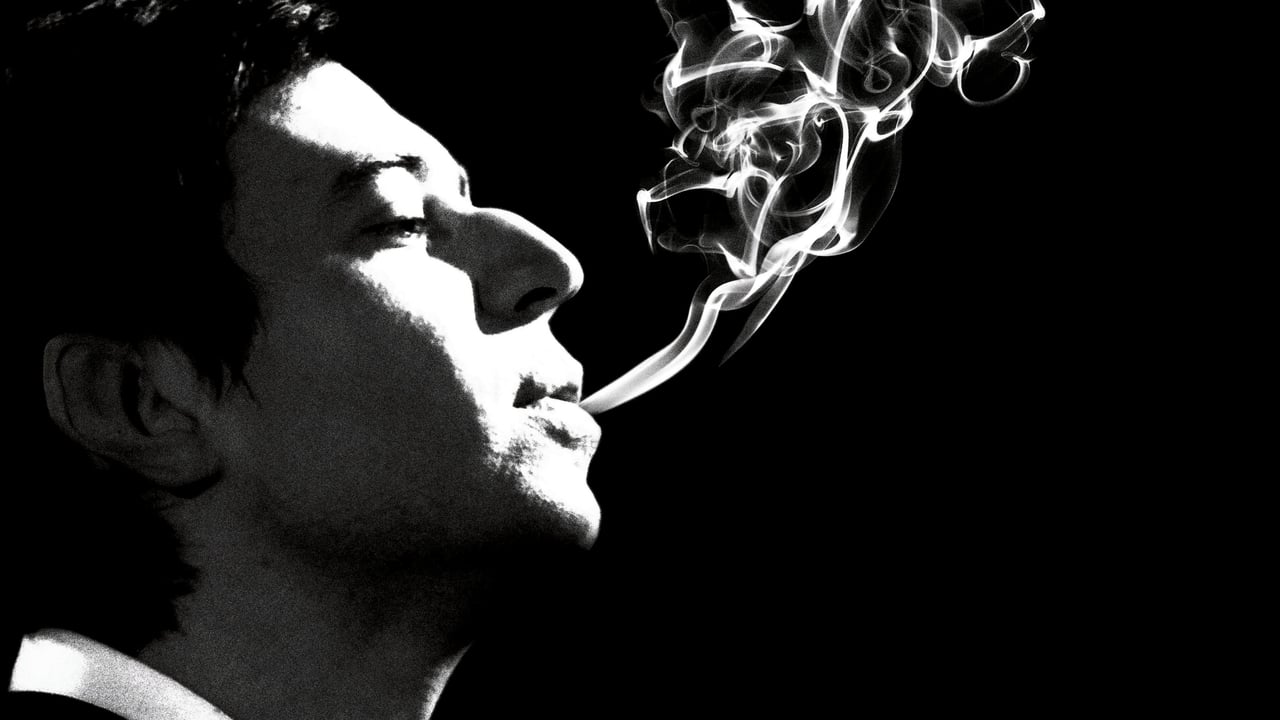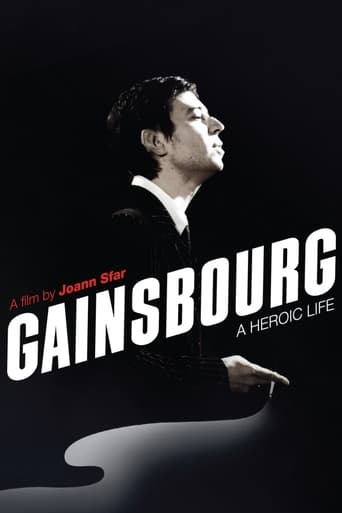Tockinit
not horrible nor great
IncaWelCar
In truth, any opportunity to see the film on the big screen is welcome.
Aspen Orson
There is definitely an excellent idea hidden in the background of the film. Unfortunately, it's difficult to find it.
dromasca
Where does this amazing film come from? Who is Joann Sfar, a director I never heard about before? The easiest answer at hand was the wikipedia entry which tells us that Sfar is a well known comics author in the fabulous French-Belgian tradition. He is of Jewish origin, and his next film is an adaptation of one of his comics successes called The Rabbi's Cat.And suddenly all makes sense. The opening scenes of the film contain the key of the biography of French musician and poet Serge Gainsbourg as imagined by Sfar. We see Lucien Ginzburg, a Jewish kid in occupied Paris during WWII daring not only to laugh in fronde at the nose of the collaborationist police by being the first in line to receive his yellow Star of David as a sign of nobility rather than an anathema, but moreover, to transform in his mind and his sketch drawings the fat rapacious Jew on the Vichy posters in the thin, stylish, long nose and big years Gueule - the alter-ego who will guide his steps and feed his revenging self-confidence for the rest of his life.The combination of acting and cartoon is not a new thing, but it has never been tried before in a biopic to the best of my knowledge. Sure, it is not the usual respectful biopic but it's the vision of Sfar about Ginzburg - Gainsbourg, and Sfar he says in the final text before the credits was more interested about Gainsbourg lies than by his perceived truths. Moreover, for sure Gainsbourg himself would not have appreciated a respectful film. Ironically under-titled 'Vie heroique' (heroic life) the film takes us though the artistic and especially womanizing career of Gainsbourg from the early 50s to the late 70s. We see him in the company of such French cultural icon as Boris Vian and especially of fabulous women such as Juliette Greco, Brigitte Bardot and Jane Birkin (and actually the list in the film is very partial). I enjoyed each of the scenes in this part of the film which combine style, attention to details (just follow how fashion changes marking the progress of time) and deep understanding of the atmosphere of the Parisian clubs and artistic milieu in the mythic mid-20 century. His Gueule alter-ego mentors him though this trip and when he decides to renounce his patronizing, it's the beginning of the end - the charisma goes away and the effects of his excesses slowly destroy him. Maybe a little more of his art would have provided an even more complex and balanced image of the person that Gainsbourg was - this would be my only observation.The choice of Eric Elmosnino as Gainsbourg is excellent, he drives the character from the insecurity of the young age to the decay of the end, all the time with charm and deep empathy. He proves a perfect understanding of the intentions of the director and a full identification with the identity dilemmas of the French-Jewish Gainsbourg. Laetitia Casta is a perfect replica of Bardot. Lucy Gordon is mastering very well Jane Birkin's role. Her maturity makes even harder to explain the suicide of the young actress a few days before the film was presented in avant-premiere at Cannes.
ptb-8
This smoky snazzy superficial look at the life of sex and song of Serge Gainsbourg and the women he seduced is a fairly interesting movie. However at 130 mins it can do with a haircut. In fact most everyone in the film could have done with one, or at least a comb. All bohemian, lazy, sleepy and ennui soaked, we get to see how boy Lucien Gainsbourg morphed from butterfly child into Serge the Caterpillar adult with his 'charms' exuding Gallic sex appeal to some very famous pop culture women. His comic book songs are really just bubblegum and the Bonnie Parker song of 1967 is a ridiculous moment in radio junk. I remember these songs from 42 years ago and all this film did was remind me how silly the songs were... like something from a BEACH PARTY drive in movie but with Serge and Brigitte pouting and spouting at each other. The Jane Birkin years are far more interesting but the film slides into maudlin parody of what is becoming a boring indulgent man by the 2 hour mark. Seeing him flopping around a disco is tragic and boring. The use of a puppet as his alter ego is a terrific device. The film is well made and overall a few blips above interesting. The shattering news that actress Lucy Gordon suicided at age 28 casts a really dark heartache over the film. Remember those awful Euro pop songs of the 60s like Blue Blue My love Is Blue... well we are in a bio about a man who wrote songs just a bit better than that. It all just reminds you to see Euro pop flicks like BARBARELLA again. If you go into this willing to float along with it, then you will be satisfied.
fabrice-angelini
I think you have to be french and know of Serge Gainsbourg's music and life to fully appreciate the genius of this movie. It could have been a very sad and dark story but Sfar chose to turn it into a joyful and remarkable fairy tell. What are the odds to find an actor being a clone of this very odd looking man, with over all an incredible tone accuracy in his playing? I had a smile on my face from the start to the end and enjoy every single minute of this funny and creative portrait. The music is simply divine, of course, its Gainsbourg's! Juliette Greco, Brigitte Bardot, Jane Birkin, Bambou, some of the many women of his life are also remarkably played by great look a like actresses, all of the same status! If you knew who Gainsbourg was, you'll be enchanted, if you don't you'll discover, too late thou, one of the greatest musician and poet France ever had!
the_rattlesnake25
Lucien 'Serge Gainsbourg' Ginsburg. Artist. Writer. Performer. Alcoholic. Smoker. Rebel. Womanizer. Genius? Joann Sfar's film documents the sporadic lifestyle of the famous French artist Serge Gainsbourg (Eric Elmosnino), whose life contained no boundaries, no objects off limit, and continually tested the patience of those huddled together around him. Beginning with a young Gainsbourg developing his taste for painting aspiring models in Nazi-Occupied France as a mere teenager, the film thereupon concentrates primarily upon his relationships with various beautiful women and his life choices in regards to his ever-changing occupation over his sixty-year-life-span.What makes this film work so well as a biopic is the truly ingenious performances by both Kacey Mottet Klein (Young Gainsbourg) and Eric Elmosnino (Adult Gainsbourg) who both somewhat beautifully represent such a tragic figure throughout his whole on-screen lifetime. Kacey portrays Gainsbourg as a boy who is maturing faster than those other children around him, so far so, that he explains to one of the schoolchildren the reason that he is good at drawing pubic hairs is because he has had an up-close and personal experience with them before. While he is also shown to be a lonely child, an outcast as Jewish child growing up in Nazi-Occupied France, and thus he develops an affable 'imaginary friend' to keep himself company. Born as small, soft head that watches over young Gainsbourg as he sleeps in the woods to avoid the Nazi soldiers, his only friend soon becomes his worst enemy as he matures into a complicated man. His once pleasant 'imaginary friend' is now a grotesque being with a large nose, long-thin fingers and an affection for cigarettes and bullying Gainsbourg. He continually berates insults, prods and engages Serge, providing the viewpoint that he himself was his harshest critic, and a critic he could not simply dismiss without entire control over his life.Aside from the performances, the way Sfar allows the films narrative to flow in a temporal manner with no mention of time, or calendar dates, further draws the audience in to Gainsbourg's contrived world. The only way to tell when an event shifts forward in his lifetime, is through his own physical deterioration from old age which is heavily dictated by his excessive abuse of alcohol and tobacco. But as Gainsbourg becomes older, his sexual conquests stay the same age; from Elisabeth (Deborah Grall), to Jane (the late Lucy Gordon), and to an affair with the insatiable Brigitte Bardot (Laetitia Casta), before he eventually settles down with Bambou (Mylene Jampanoi), who would be his final partner. These are all young, vulnerable women who Gainsbourg exploits for his own sexual misgivings, and once they become too old, or too boring, he discards them like a child throwing away an old toy to badger his parents for a new, more expensive model.Joann Sfar beautifully flowing biopic paints Serge Gainsbourg as a shallow, misogynistic, grumpy old man, who once had dreams of becoming famous for doing anything, but once those dreams were realised, greed and narcissism triumphed over his once forgotten ambitions. Utilizing his gift for writing, artistry and music Gainsbourg chose the route of controversy and scandal over that of happiness and family, which is exemplified in his response to the media after he had a heart attack. When the reporters asked what he will be doing now after such a dangerous and life threatening operation, Gainsbourg calmly asserted to those in attendance that he will "continue to smoke many more cigarettes and drink much more alcohol."

